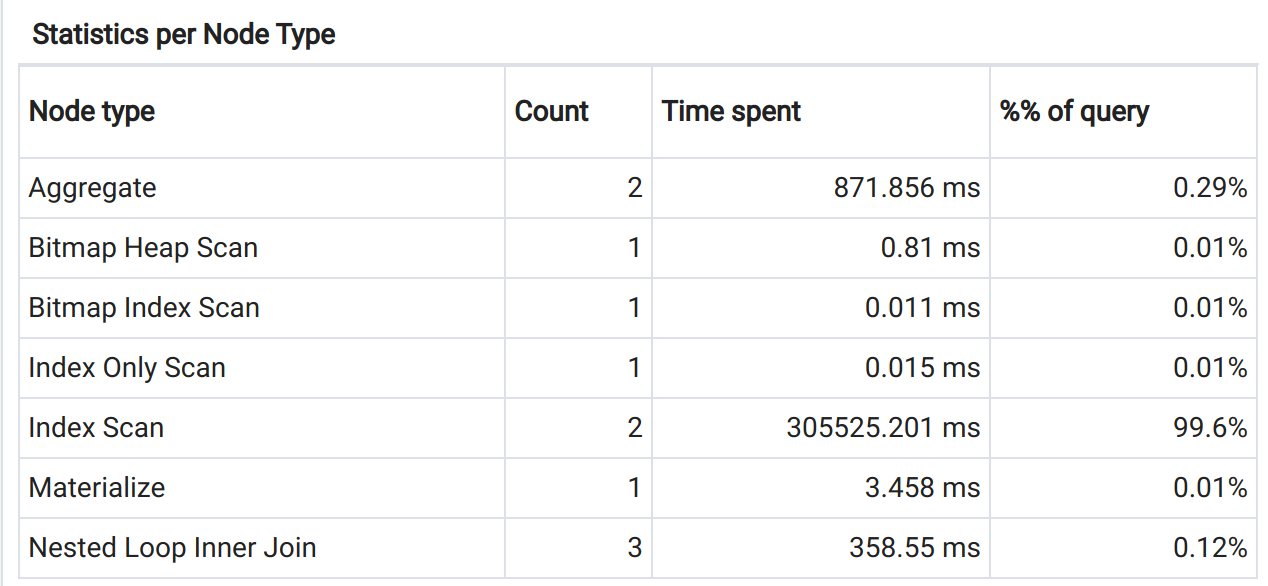I have a large table (~500M records, 85GB in size) on a PostgreSQL 10.10 database (AWS RDS instance). The records are created by a bunch of game simulations which insert "events" whenever they happen in the simulation. Here is a sample record:
| runnum | time | event_id | event_type | event_flag | event_json | area_id |
|---|---|---|---|---|---|---|
| 154052 | 0 | 3535337 | 6 | 9 | {"object": 27561, "subject": 28073, "object_loc": 10778050, "subject_loc": 3737, "captured": 5} |
3737 |
where runnum is the run number, time is the simulation time the event was generated, event_type and event_flag are enums to describe the event, and event_json is the event's data in jsonb format (this allows for different types of events which have different payloads).
I want query for the total sum of "captured" bases in a specific scenario, for each run.
I have an index defined like so:
CREATE INDEX events_runnum_type_captured
ON details.events USING btree
(runnum ASC NULLS LAST, event_type ASC NULLS LAST, ((event_json ->> 'captured'::text)::integer) ASC NULLS LAST)
TABLESPACE pg_default;
and my query is:
SELECT programming_scenario_id, D.runnum, SUM((A.event_json->>'captured')::int) as times
FROM simulations.programming_scenarios F
JOIN simulations.runs D ON D.programming_scenario_id = F.id
JOIN details.events A ON A.runnum = D.runnum AND A.event_type = 6
WHERE
id IN (SELECT id FROM simulations.programming_scenarios WHERE assessment_id = 180)
GROUP BY programming_scenario_id, D.runnum
This query takes ~5 minutes to complete, which seems slow to me, considering it has a full covering index and could benefit from an Index-Only scan.
I've investigated using EXPLAIN and this is the output:
GroupAggregate (cost=15.15..1464244.05 rows=4272 width=20)
Group Key: d.runnum
-> Nested Loop (cost=15.15..1454074.88 rows=810116 width=132)
-> Nested Loop (cost=14.58..1101.10 rows=291 width=12)
Join Filter: (f.id = d.programming_scenario_id)
-> Index Scan using runs_runnum_idx on runs d (cost=0.28..873.90 rows=4272 width=12)
-> Materialize (cost=14.29..34.97 rows=3 width=8)
-> Nested Loop (cost=14.29..34.96 rows=3 width=8)
-> HashAggregate (cost=14.02..14.05 rows=3 width=4)
Group Key: programming_scenarios.id
-> Bitmap Heap Scan on programming_scenarios (cost=4.30..14.01 rows=3 width=4)
Recheck Cond: (assessment_id = 180)
-> Bitmap Index Scan on programming_scenarios_assessment_id_idx (cost=0.00..4.30 rows=3 width=0)
Index Cond: (assessment_id = 180)
-> Index Only Scan using programming_scenarios_id_idx on programming_scenarios f (cost=0.28..6.96 rows=1 width=4)
Index Cond: (id = programming_scenarios.id)
-> Index Scan using events_runnum_type_captured on events a (cost=0.57..4965.23 rows=2781 width=128)
Index Cond: ((runnum = d.runnum) AND (event_type = 6))
From an analysis on pgAdmin4, it seems the Index Scan using events_runnum_type_captured on events a is the main culprit, taking most of the execution time.
 I would expect Postgres to use an
I would expect Postgres to use an Index-Only scan in this case, since all returned fields are in the index.
I've already run VACUUM ANALYZE on the table to make sure the query plans are up-to-date, to no avail.
Is there anything I can do to speed up this query?
EDIT:
As requested, here is the output of EXPLAIN(ANALYZE, BUFFERS):
GroupAggregate (cost=15.15..1464244.05 rows=4272 width=20) (actual time=734.949..199676.720 rows=500 loops=1)
Group Key: d.runnum
Buffers: shared hit=201586 read=702520
-> Nested Loop (cost=15.15..1454074.88 rows=810116 width=132) (actual time=0.509..198947.468 rows=1542148 loops=1)
Buffers: shared hit=201586 read=702520
-> Nested Loop (cost=14.58..1101.10 rows=291 width=12) (actual time=0.102..12.800 rows=500 loops=1)
Join Filter: (f.id = d.programming_scenario_id)
Rows Removed by Join Filter: 21005
Buffers: shared hit=71 read=745
-> Index Scan using runs_runnum_idx on runs d (cost=0.28..873.90 rows=4272 width=12) (actual time=0.009..7.647 rows=4301 loops=1)
Buffers: shared hit=50 read=745
-> Materialize (cost=14.29..34.97 rows=3 width=8) (actual time=0.000..0.000 rows=5 loops=4301)
Buffers: shared hit=21
-> Nested Loop (cost=14.29..34.96 rows=3 width=8) (actual time=0.040..0.047 rows=5 loops=1)
Buffers: shared hit=21
-> HashAggregate (cost=14.02..14.05 rows=3 width=4) (actual time=0.021..0.022 rows=5 loops=1)
Group Key: programming_scenarios.id
Buffers: shared hit=5
-> Bitmap Heap Scan on programming_scenarios (cost=4.30..14.01 rows=3 width=4) (actual time=0.013..0.018 rows=5 loops=1)
Recheck Cond: (assessment_id = 180)
Heap Blocks: exact=3
Buffers: shared hit=5
-> Bitmap Index Scan on programming_scenarios_assessment_id_idx (cost=0.00..4.30 rows=3 width=0) (actual time=0.010..0.010 rows=5 loops=1)
Index Cond: (assessment_id = 180)
Buffers: shared hit=2
-> Index Only Scan using programming_scenarios_id_idx on programming_scenarios f (cost=0.28..6.96 rows=1 width=4) (actual time=0.004..0.005 rows=1 loops=5)
Index Cond: (id = programming_scenarios.id)
Heap Fetches: 5
Buffers: shared hit=16
-> Index Scan using events_runnum_type_captured on events a (cost=0.57..4965.23 rows=2781 width=128) (actual time=0.819..397.212 rows=3084 loops=500)
Index Cond: ((runnum = d.runnum) AND (event_type = 6))
Buffers: shared hit=201515 read=701775
Planning time: 8.195 ms
Execution time: 199677.031 ms
The WHERE predicate (id IN (SELECT id FROM simulations.programming_scenarios WHERE assessment_id = 180)) matches about 15% of the total rows (~73M out of ~500M).

EXPLAIN (ANALYZE, BUFFERS)into your question? What percentage of the records match theWHEREpredicate?